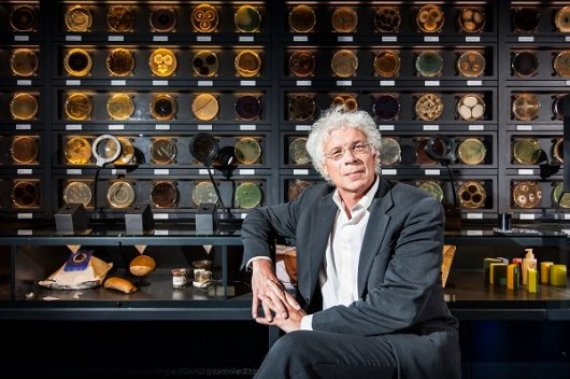Willem de Vos. © Bram Belloni
To achieve this, the company uses the bacterium Akkermansia muciniphila. This bacterium, which naturally occurs in the human digestive system, helps to fight obesity, as well as presumably various illnesses such as fatty liver and inflammatory bowel disease.
Akkermansia was discovered by chance by De Vos in 2004. At the time, the professor at the Microbiology group was searching for bacteria that grow on substances produced by our bowels, such as mucus. ‘I had the feeling there would be several interesting and useful species among the ones present, but proof of that was lacking. This made finding funds for the research difficult. I had to submit the proposal three times.’ Upon the third submission, the proposal was awarded funding and his PhD candidate Muriel Derrien was able to start with the research. ‘It was very nice to eventually find that my expectations were correct’, De Vos says.
Easy applications
Four years after the discovery, De Vos started a collaboration with the Belgian professor Patrice Cani of the University of Louvain to further investigate and itemise the health impact of the bacterium. Upon administering the bacterium in mice, it decreased obesity and type 2 diabetes. Later, the Belgian research group discovered that the remedy can be used safely in humans. ‘The interesting part is that the bacterium also has these effects when pasteurised’, De Vos adds. ‘Our research has demonstrated that it is most probably a specific protein that causes the effect. This means the bacterium does not need to be alive, which makes applications in food much easier.’
It is probably because of this relative ease of application that A-Mansia, which has acquired several patents on Akkermansia, has been able to raise the required start-up capital in an unusually short time. The desired 13 million euros were raised within a year. A relatively significant investment was made by the French investment fund Seventure. In the next few years, A-Mansia will use the money to further investigate the applications of the bacterium. This includes both medical and nutritional applications. A large part of the research will presumably take place near the University of Louvain in Wallonia, the French-speaking part of Belgium. A smaller part will take place in Wageningen, which has less experience with the medical sector. ‘But we might do something in the United States as well.’
Not the first start-up
Willem de Vos is among WUR’s best reputed professors. An analysis of the WUR library revealed that he has been the most cited Wageningen researcher (article in Dutch) in the past years. Furthermore, A-Mansia is far from being his first start-up. In the last few years, he was involved in three new companies in the Netherlands alone, for each of which his research was the starting point. However, A-Mansia is one of De Vos’ largest start-ups. He plans to remain involved with the new company. ‘I have been professor for about thirty years, and I am slowly stepping down. I will have more time to invest in the company soon.’

